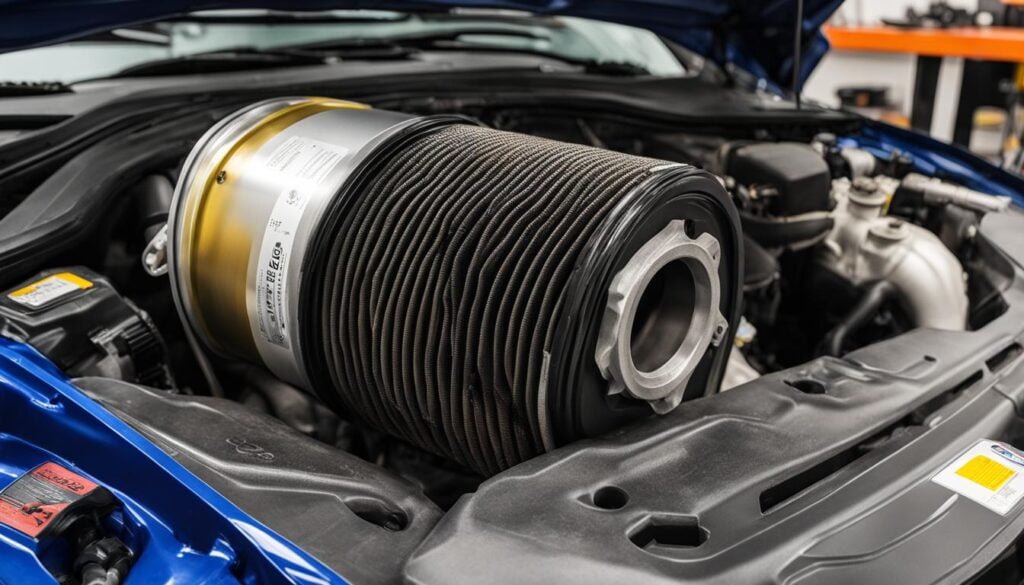The BMW G20 is a highly regarded vehicle that offers exceptional performance, luxury, and cutting-edge technology. However, like any complex machinery, it is not without its common problems. Owners of the BMW G20 may experience issues such as coolant loss, oil filter damage, problems with VANOS solenoids, valve cover gasket failure, side mirror and master switch malfunctions, front grill vent issues, starting problems, drivetrain malfunction, and more. It is important for BMW G20 owners to be aware of these common problems and implement regular maintenance to ensure their vehicle performs optimally.
Key Takeaways:
- BMW G20 owners may encounter common problems such as coolant loss, oil filter damage, and issues with VANOS solenoids.
- Regular maintenance is essential for optimal performance and reliability of the BMW G20.
- Monitoring coolant levels and inspecting for leakage can help prevent engine complications.
- Routine oil changes with high-quality filters minimize the risk of debris accumulation and engine damage.
- Early detection and addressing of issues can help maintain the health and performance of the BMW G20.
Coolant Loss and Engine Complications
When it comes to the BMW G20, coolant loss is a common issue that can have serious implications for the engine if not addressed promptly. Some BMW G20 owners have reported experiencing coolant leakage, which can lead to engine complications and potential damage.
It is crucial for BMW G20 owners to regularly monitor their coolant levels and inspect for any signs of leakage. Coolant plays a vital role in keeping the engine cool and preventing overheating. If coolant loss is detected, it is recommended to have the issue resolved by a professional to avoid further damage to the engine.
Proactive measures, such as checking coolant levels during routine maintenance and addressing any leaks promptly, can help prevent engine issues and ensure the optimal performance of your BMW G20.
Signs of Coolant Loss:
- Visible coolant leakage underneath the vehicle
- Low coolant level indicator on the dashboard
- Engine overheating
- White exhaust smoke
- Sweet smell in the cabin
If you notice any of these signs, it is essential to take immediate action and have your BMW G20 inspected by a professional to determine the cause of the coolant loss and prevent any further engine complications.
| Causes of Coolant Loss in BMW G20 | Potential Engine Complications |
|---|---|
| Leaking hose or radiator | Engine overheating, potential coolant pump failure |
| Blown head gasket | Loss of engine power, oil and coolant contamination, potential engine damage |
| Cracked cylinder head | Engine misfire, loss of compression, potential engine failure |
It is important to address coolant loss and any associated engine complications as soon as possible to maintain the performance and reliability of your BMW G20. Regular maintenance and timely repairs are key to ensuring a long and trouble-free driving experience.
Oil Filter Damage and Debris Accumulation
Accumulated debris in the oil filters of BMW G20 models can result in significant engine damage. To prevent this issue, it is crucial to adhere to routine oil changes and opt for high-quality filters. Regular oil changes with premium filters help maintain smooth engine operation and minimize the risk of oil filter damage.

Preventing Debris Accumulation
One of the key aspects of maintaining the engine’s health in a BMW G20 is by ensuring that the oil filter remains clean and free from debris. Over time, oil filters can accumulate dirt, dust, and other particles that can cause blockages and impact engine performance. Regular oil changes at the recommended intervals and using high-quality filters can prevent debris accumulation and safeguard the engine’s longevity.
Choosing the Right Filters
When it comes to selecting oil filters for your BMW G20, it is important to prioritize quality. Investing in premium filters ensures superior filtration performance and better protection for your engine against harmful contaminants. These filters are specifically designed to trap even the smallest particles, preventing them from circulating through the engine and causing damage.
Additionally, high-quality filters are more durable and can withstand the rigors of the engine’s operation, reducing the risk of filter failure and debris accumulation. They provide optimal flow rates, allowing the engine to receive a consistent supply of clean oil, which is crucial for maintaining efficient performance and prolonging the engine’s life.
Regular Maintenance and Inspections
In addition to regular oil changes and using quality filters, it is essential to follow the manufacturer’s recommended maintenance schedule for your BMW G20. This includes routine inspections of the oil filter, where any signs of damage, debris, or abnormal wear should be addressed immediately. Timely maintenance and inspections help identify and resolve potential issues before they escalate, ensuring the engine continues to perform at its best.
VANOS Solenoid and Timing Issues
The VANOS solenoids in BMW G20 models can experience problems, leading to issues with engine timing and overall performance. The VANOS system is responsible for adjusting the timing of the engine’s valves, optimizing power delivery and fuel efficiency. When the VANOS solenoids malfunction, it can result in poor engine performance, reduced fuel efficiency, and potential engine damage.
If you notice a decline in engine efficiency or experience issues such as rough idling, engine misfires, or reduced power, it is advisable to have the VANOS solenoids inspected by a professional technician. They can perform diagnostic tests to determine if the solenoids are functioning properly and identify any potential timing issues.
Timely repairs or replacements of faulty VANOS solenoids can help restore optimal engine performance and prevent further damage to the engine. It is crucial to address these issues promptly to ensure the longevity and reliability of your BMW G20.
Common Symptoms of VANOS Solenoid and Timing Issues:
- Reduced engine power and acceleration
- Poor fuel efficiency
- Rough idling or engine vibrations
- Engine misfires
- Illuminated check engine light
Professional Repair and Maintenance:
When encountering VANOS solenoid and timing issues, it is recommended to consult a professional BMW technician who specializes in diagnosing and repairing BMW G20 engines. They have the expertise and tools necessary to accurately diagnose the problem and perform the necessary repairs or replacements.
Regular maintenance is also essential to prevent VANOS solenoid and timing issues. Following BMW’s recommended maintenance schedule and conducting routine inspections can help identify and address potential problems before they escalate.
Comprehensive Maintenance Tips for BMW G20 Owners
Regular maintenance is vital for the optimal performance and longevity of your BMW G20. By following these maintenance tips, you can keep your vehicle running smoothly and avoid costly repairs down the line.
1. Regular Oil Changes
One of the most important maintenance tasks for your BMW G20 is regular oil changes. Using high-quality oil and adhering to BMW’s recommended oil change intervals will help keep your engine running smoothly. Regular oil changes promote engine longevity and performance.
2. Brake System Inspections
Frequent inspections of your brake system are essential for safety and performance. Check the brake pads, rotors, and fluid regularly to ensure optimal braking performance. Replace worn-out brake components promptly to prevent potential issues on the road.
3. Tire Maintenance
Regularly checking your tire pressure and tread depth is crucial for both performance and safety. Underinflated or worn-out tires can affect fuel efficiency and compromise handling. Maintain the recommended tire pressure and replace tires when the tread depth becomes too low.
4. Battery Care
Ensure your BMW G20’s battery is in optimal condition by inspecting it regularly. Clean any corrosion from the terminals, and consider testing the battery’s charge level periodically. Weak or faulty batteries can cause starting problems and other electrical issues.
5. Adhere to BMW’s Recommended Maintenance Schedule
BMW provides a recommended maintenance schedule for the BMW G20, specifying tasks such as oil and filter changes, coolant checks, fuel filter inspections, and more. Adhering to this schedule is crucial for keeping your BMW G20 in top condition and ensuring its long-term performance and reliability.
| Maintenance Task | Frequency |
|---|---|
| Oil and Filter Change | Every 7,500 miles or as recommended by BMW |
| Coolant Check | Every 20,000 miles or as recommended by BMW |
| Fuel Filter Inspection | Every 40,000 miles or as recommended by BMW |
| Brake Fluid Check | Every 30,000 miles or as recommended by BMW |
| Transmission Fluid Change | Every 50,000 miles or as recommended by BMW |
By following these comprehensive maintenance tips and adhering to BMW’s recommended maintenance schedule, you can ensure your BMW G20 performs optimally, lasts longer, and delivers the exceptional driving experience you expect.
Conclusion
The BMW G20 is a remarkable vehicle that offers outstanding performance and luxury. However, like any sophisticated machine, it is not immune to common problems. Therefore, it is crucial for owners to stay informed and take a proactive approach to maintenance in order to ensure the vehicle’s reliability and longevity.
Addressing common issues such as coolant loss, oil filter damage, and VANOS solenoid problems is essential. Regular inspections and early detection of these issues can help prevent more serious complications and maintain the health and performance of the BMW G20.
Moreover, following a comprehensive maintenance schedule is key to enjoying the full range of services that the BMW G20 has to offer. By adhering to BMW’s recommended guidelines for oil changes, coolant checks, and fuel filter inspections, owners can maximize the lifespan of their vehicles and avoid unexpected roadblocks.
In conclusion, proactive maintenance and regular inspections are essential for BMW G20 owners. By addressing common problems and following a comprehensive maintenance schedule, owners can ensure that their BMW G20 continues to deliver exceptional performance and luxury throughout its lifespan.
FAQ
What are some common problems with the BMW G20?
Some common problems with the BMW G20 include coolant loss, oil filter damage, issues with VANOS solenoids, valve cover gasket failure, side mirror and master switch malfunctions, front grill vent issues, starting problems, and drivetrain malfunctions.
What should I do if I notice coolant loss in my BMW G20?
If you notice coolant loss in your BMW G20, it is important to have the issue addressed promptly to prevent more serious engine complications. Regularly monitor coolant levels and inspect for signs of leakage. If coolant loss is detected, have the issue resolved by a professional to avoid further damage to the engine.
How can I prevent oil filter damage in my BMW G20?
To prevent oil filter damage in your BMW G20, adhere to routine oil changes and opt for high-quality filters. Regular oil changes with premium filters help maintain smooth engine operation and minimize the risk of oil filter damage. It is important to follow the manufacturer’s recommended maintenance schedule.
What should I do if I experience issues with VANOS solenoids in my BMW G20?
If you experience issues with VANOS solenoids in your BMW G20, it is advisable to have them inspected by a professional. Problems with VANOS solenoids can lead to issues with engine timing and overall performance. Timely repairs or replacements can help ensure optimal engine performance and prevent further damage.
What are some comprehensive maintenance tips for BMW G20 owners?
To maintain optimal performance and longevity of your BMW G20, prioritize regular oil changes with high-quality oil, frequent inspections of the brake system, including pads, rotors, and fluid, regular checks of tire pressure and tread depth, and ensure the battery is in optimal condition. Adhering to BMW’s recommended maintenance schedule, which includes tasks such as oil and filter changes, coolant checks, fuel filter inspections, and more, is crucial for keeping the BMW G20 in top condition.
How can I ensure the reliability and longevity of my BMW G20?
To ensure the reliability and longevity of your BMW G20, it is important to be aware of common problems and implement proactive maintenance. Regular inspections, addressing coolant loss, oil filter damage, and VANOS solenoid issues, and following a comprehensive maintenance schedule are key. By taking these measures, you can enjoy your BMW G20’s performance and luxury without encountering unexpected issues.

